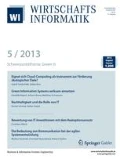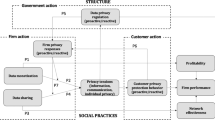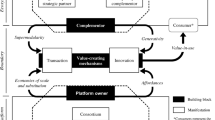Abstract
Music filesharing systems based on peer-to-peer technology are increasingly menacing the entire music industry. After neglecting the issue in the beginning, the major music labels are now struggling to enforce their property rights in the Internet in order to maintain their profits — up to now without substantial impact.
The iTunes Music Store, presented by Apple Inc. in April 2003 is the first commercial service able to persuade a considerable number of internet users to pay for digital music they download. This article discusses the major factors which contribute to iTunes’ success and analyses the service from different perspectives.
From a technological point of view, the digital rights management systems stand out as they are quite liberal and even include peer-to-peer elements. The business perspective suggests that its success lies in the integration of the music industry’s need for compensation with the customers’ requirements to exchange music files and to write them to CD. Taking a new institutional economics approach, the service pays attention to the fact that in the Internet age some (intellectual) property rights can not be enforced in a way the music industry was used to in pre-Internet times. Leaving some property rights not allocated the remaining property rights can be enforced more efficiently by presenting an innovative and easy-to-use service.
Similar content being viewed by others
Literatur
Barzel, Yoram: Economic analysis of property rights. 2. Aufl., Cambridge University Press, Cambridge 1997.
Bechtold, Stefan: Vom Urheber- zum Informationsrecht — Implikationen des Digital Rights Management. Beck, München 2002.
Becker, Jan U.; Clement, Michel: Generation Napster — Das ö konomische Kalkü l eines Anbieters von Medien-Dateien bei Filesharing-Diensten. In: Wirtschaftsinformatik 45 (2003) 3, S. 261–271.
Drösser, Christoph; Hamann, Gö tz: Die Jobs-Maschine. In: Die Zeit, 15.05.2003, S. 19–20.
Fattah, Hassan M.: P2P: How Peer-to-Peer Technology Is Revolutionizing the Way We Do Business. Dearborn Trade Publishing, Chicago 2002.
Furubotn, E. G.; Pejovich, S.: Introduction: The New Property Rights Literature. In: Furubotn, E. G. and Pejovich, S. (Hrsg.): The Economics of Property Rights. Ballinger, Cambridge 1974, S. 1–9.
Gehrke, Nick; Anding, Markus: A Peerto-Peer Business Model for the Music Industry. In: Monteiro, J. e. a. (Hrsg.): Towards the knowledge society — eCommerce, eBusiness and eGovernment. Kluwer Academic Publishers, Boston 2003, S. 243–257.
Hess, Thomas: Implikationen des Internet für die Medienbranche — eine strukturelle Analyse. In: Keuper, Frank (Hrsg.): Electronic Business und Mobile Business — Ansätze, Konzepte und Geschäftsmodelle. Gabler, Wiesbaden 2002, S. 569–602.
Hess, Thomas: Die Bedeutung von Peerto-Peer-Systemen für Musiklabels — Ergebnisse erster Analysen. In: Wirtz, Bernd W. (Hrsg.): Handbuch Medien- und Multimediamanagement. Gabler, Wiesbaden 2003, S. 425–439.
Ifpi: Jahreswirtschaftsbericht 2002. http://www.ifpi.de/jb/2003/54-60.pdf, Abruf am 2003-07-04.
Kniebe, Tobias: Die Millionen-Frage. In: Sü ddeutsche Zeitung, 05.06.2003, S. 13.
Laube, Helene; Ohler, Arndt: Real Networks startet Preiskampf um Onlinemusik. In: Financial Times Deutschland, 30.05.2003, S. 4.
O.V.: iTunes Amazon deal expected. http://www.macworld.co.uk/news/main_news.cfm?NewsID=6394, Abruf am 2003-07-04.
O.V.: The iTunes Music Store. Downloads done right. http://www.apple.com/music/store/, Abruf am 2003-07-04.
O.V.: Online Music Post-Napster. http://www.techtv.com/news/news/jump/0,24196,3426435,00.html, Abruf am 2003-07-04.
O.V.: Rock and roll will never die. It is, however, being reborn. http://www.apple.com/music/, Abruf am 2003-07-04.
Oram, Andy (Hrsg.): Peer-to-Peer: Harnessing the Power of a Disruptive Technology. O’Reilly & Associates Inc., Beijing u. a. 2001.
Patalong, Frank: Apples Musikdienst hebt ab. http://www.spiegel.de/netzwelt/netzkultur/0,1518,247514,00.html, Abruf am 2003-07-04.
Picot, Arnold; Fiedler, Marina: Impacts of DRM on Internet based Innovation. In: Becker, Eberhard; Buhse, Willms; Günnewig, Dirk; Rump, Niels (Hrsg.): Digital Rights Management: Technological, Economic, Legal and Political Aspects, Springer, Berlin u. a. 2003, S. 326–343.
Picot, Arnold; Dietl, Helmut; Franck, Egon: Organisation — Eine ö konomische Perspektive. 3., ü berarb. und erw. Aufl., Schäffer-Poeschel, Stuttgart 2002.
Schoder, Detlef; Fischbach, Kai: Peer-to-Peer. In: Wirtschaftsinformatik 44 (2002) 6, S. 587–589.
Shapiro, Carl; Varian, Hal R.: Information Rules — a strategic guide to the network economy. Harvard Business School Press, Boston 1998.
Author information
Authors and Affiliations
Corresponding author
Rights and permissions
About this article
Cite this article
von Walter, B., Hess, T. iTunes Music Store — Eine innovative Dienstleistung zur Durchsetzung von Property-Rights im Internet. Wirtschaftsinf 45, 541–546 (2003). https://doi.org/10.1007/BF03250919
Issue Date:
DOI: https://doi.org/10.1007/BF03250919




